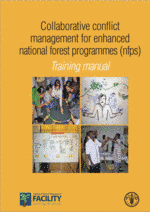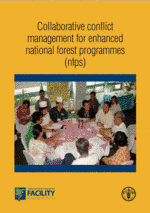Tools
A tool is a resource that supports and guides the implementation of SFM. This section includes all the tools available in the SFM Toolbox, which can be in form of publications, e-learning videos, software etc.
You can browse the Tools through keywords in the free search box or you can narrow the search using the filters on the right side of the page.
This WWF manual details on-the-ground experience and scientific knowledge to help conservation practitioners, protected area managers and other stakeholders who are responsible for protecting and managing the world's mangrove forests in a changing climate.
This methods manual is intended for use by conservation practitioners and mangrove managers to carry out an...
The purpose of the sourcebook is to further elaborate the concept of Climate Smart Agriculture (CSA) and demonstrate its potential, as well as limitations. It aims to help decision makers at a number of levels (including political administrators and natural resource managers) to understand the different options that are available...
This course explores the role of forests and trees in Climate-Smart Agriculture (CSA). It takes into consideration the ecosystem services and goods that forests provide, and the importance of forests for the food security of forest-dependent people. It explores the complex relationship between climate change and forests, and how adaptation...
Coastal protection in the aftermath of the Indian Ocean tsunami: What role for forests and trees?
2007
2007
Following the widespread wreckage and loss of life caused by the Indian Ocean tsunami of 26 December 2004, unprecedented efforts where made to restore order and rebuild the lives and livelihoods of the millions affected. A proportion of the reconstruction and rehabilitation effort was focused on environmental rehabilitation and a...
This manual is for trainers conducting training courses on collaborative conflict management for enhanced national forest programmes (nfps). It provides guidelines for designing and conducting training courses for practitioners involved in managing conflict related to forest policy. It suggests a general framework for a five-day course and provides training activities,...
Conflict among stakeholders over access, control or ownership of forest resources is a major impediment to achieving sustainable outcomes in the forest sector. It leads to loss of income, employment, government revenues and environmental services.
FAO and the national forest programme facility have developed a training module on collaborative conflict...
Collaborative conflict management for enhanced national forest programmes (nfps) - Training material
2012
2012
This manual is for trainers conducting training courses on collaborative conflict management for enhanced national forest programmes (nfps). It builds on the companion handbook (FAO, 2012), which describes the framework and processes for managing public disputes related to nfps.
The manual provides guidelines for designing and conducting training courses for practitioners...
Collect Earth is a tool that enables data collection through Google Earth. In conjunction with Google Earth, Bing Maps and Google Earth Engine, users can analyze high and very high resolution satellite imagery for a wide variety of purposes, including : Support multi-phase National Forest Inventories; Land Use, Land Use...
The e-learning on the ‘National socioeconomic surveys in forestry’ comprises four courses that aim to provide guidance on the use of forestry modules to collect data on the socioeconomic contributions of forests and non-forests environments to household welfare and livelihoods. This course describes in detail the components and questions in...
Treated Wastewater (TWW) can be used as fertigation in nurseries and to irrigate woody plantations and pastures. Their use can reduce the risk posed by drought and environmental pollution by increasing the volume of water available for productive activities and landscape restoration and simultaneously reducing the quantity of untreated wastewater...










